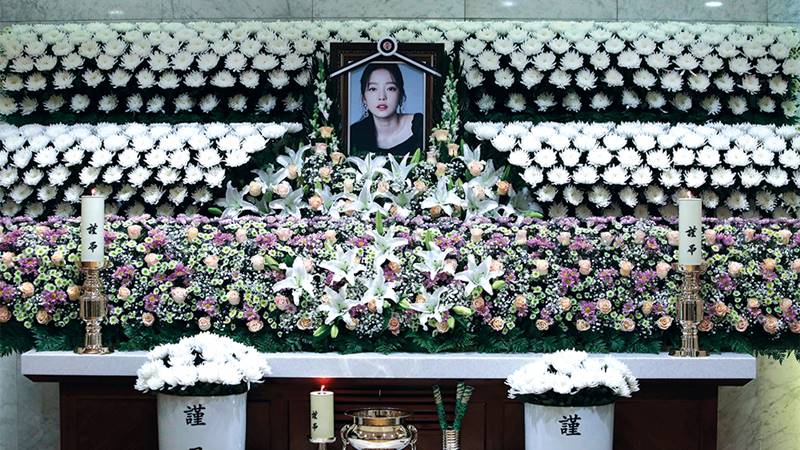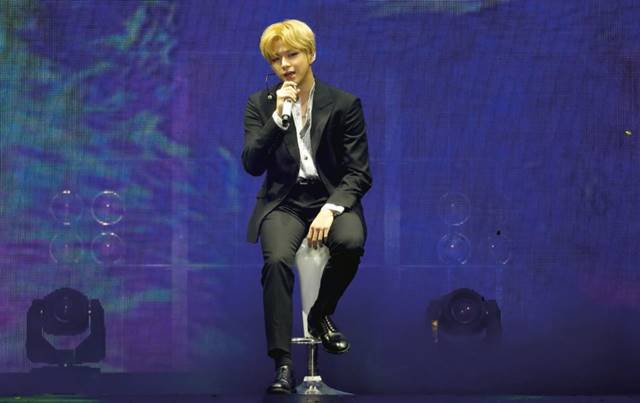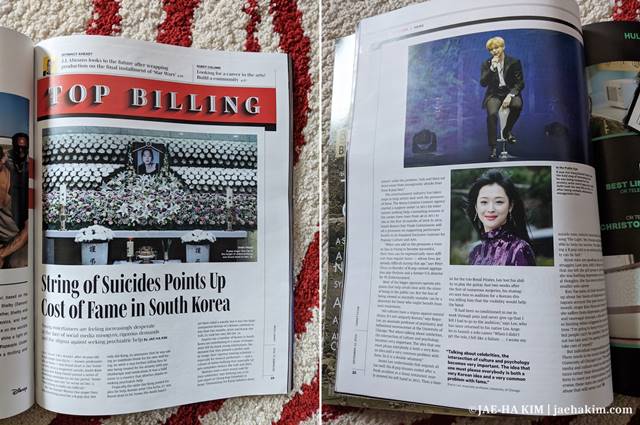
Jae-Ha Kim
Variety (.pdf)
December 12, 2019
Less than two weeks after 28-year-old K-pop singer Goo Ha-ra — known professionally as Hara — was found dead in her home on Nov. 24 in a suspected suicide, South Korean pop star Kang Daniel posted a series of troubling messages on his fan portal. “Someone please save me,” he wrote on Dec. 3. “Everything is really too difficult.”
But the former Wanna One singer then did something novel for a K-pop idol. Not only did Kang, 22, announce that he was taking an indefinite break for his own well-being; he went a step further, telling fans he was being treated for his anxiety with psychotherapy and medication. It was a bold move in a country that attaches shame to seeking psychiatric help.

Tragically, the same day Kang posted his plea for help, Korean actor Cha In-ha, 27, was found dead in his home. His death hasn’t yet been ruled a suicide, but it was the third unexpected demise of a Korean celebrity in less than two months. Actor and K-pop star Sulli, 25, took her own life Oct. 14.
Experts say a number of factors in South Korea are contributing to a sense of desperation felt by many young entertainers: the demand that they present a perfect public image, their rigorous training schedule — especially for musical performers — and a culture of online bullying that especially targets outspoken women like Sulli and Hara.
“Koreans have a strict moral code for their celebrities,” says Jeeheng Lee, a culture expert at Chung-Ang University in Seoul. “Demonizing the K-pop industry alone doesn’t solve the problem. Sulli and Hara suffered more from misogynistic attacks than from K-pop fans.”
The entertainment industry has taken steps to help artists deal with the pressures of fame. The Korea Creative Content Agency started a support center in 2011 for entertainers seeking help. Counseling sessions at the center have risen from 40 in 2011 to 164 in the first 10 months of 2019. In 2014, South Korea’s Fair Trade Commission added a provision on supporting performers’ health to its Standard Exclusive Contract for Popular Culture and Arts.
“When you add in the pressures a trainee has in trying to become successful, their lives can be exponentially more difficult than regular teens’ — whose lives are already difficult during that age,” says Peter Chun, co-founder of K-pop content aggregation app theQoos and a former U.S. director for YG Entertainment.
Most of the bigger agencies operate programs that help artists deal with the stress of being in the public eye. But the fear of being viewed as mentally unstable can be a deterrent for those who might benefit from such treatments.
“All cultures have a stigma against mental illness. It’s not uniquely Korean,” says Royce Lee, an associate professor of psychiatry and behavioral neuroscience at the University of Chicago. “But when talking about celebrities, the intersection of culture and psychology becomes very important. The idea that one must please everybody is both a very Korean idea and a very common problem with fame. So it is a double whammy.”

James Lee understands that anguish all too well. His K-pop dreams ended after a freak accident at a Seoul restaurant nearly severed his left hand in 2015. Then a bassist for the trio Royal Pirates, Lee lost his ability to play the guitar. Just two weeks after the first of numerous surgeries, his managers sent him to audition for a Korean drama, telling him that the visibility would help the band.
“It had been so conditioned in me to work through pain and never give up that I felt I had to go to the audition,” says Lee, who has since returned to his native Los Angeles to launch a solo career. “When I didn’t get the role, I felt like a failure. … I wrote my suicide note, [which] eventually became my song ‘The Light.’ My friends and family were able to help me survive. The glory of becoming a K-pop idol is so enticing. But the penalty can be hell.”
Some stars are speaking out about their struggles. Last year, 2NE1’s Minzy revealed that she left the girl group in part because she was battling depression and suicidal thoughts. She has since embarked on a smaller solo career.
Kim Tae-yeon of Girls’ Generation opened up about her bouts of depression on her Instagram account this past summer. And last month, singer Kim Hyun-ah revealed that she suffers from depression, panic disorder and vasovagal syncope, a disorder that causes fainting when triggered by emotional distress. “I’m going to keep trying to be well, but people can’t be perfect,” she wrote. “It’s not too late and I’m going to love myself and take care of myself.”
But individual responsibility isn’t enough. There needs to be social change, says the University of Chicago’s Lee. “The audience, media and culture need to shift into acceptance rather than demanding artists conform to meet our expectations,” he says. “Otherwise, these stars are caught in a loop of abuse that will never end.”
String of Suicides Highlights the Pressures on Young Entertainers in South Korea https://t.co/wEx7RM5kd5
— Variety (@Variety) December 12, 2019






This is such an important story that needed to be told. Thank you for doing so with respect and humanity.
How sad!!!
This is frightening. The same goes for many people in the industry. Why can’t we embrace human vulnerabilities instead of attacking them? Look how many women have come out and said the pressure to be thin is unrealistic? Meanwhile it’s fat old men telling them to starve themselves. I suppose because counting calories and worrying about food is not only time consuming but weakens you more. You have no strength or time to do anything else. You’re being controlled by men.